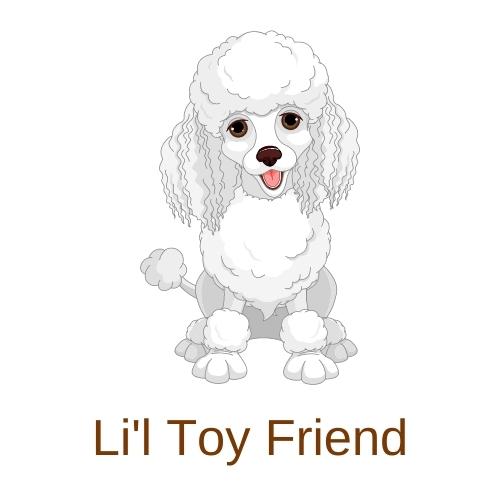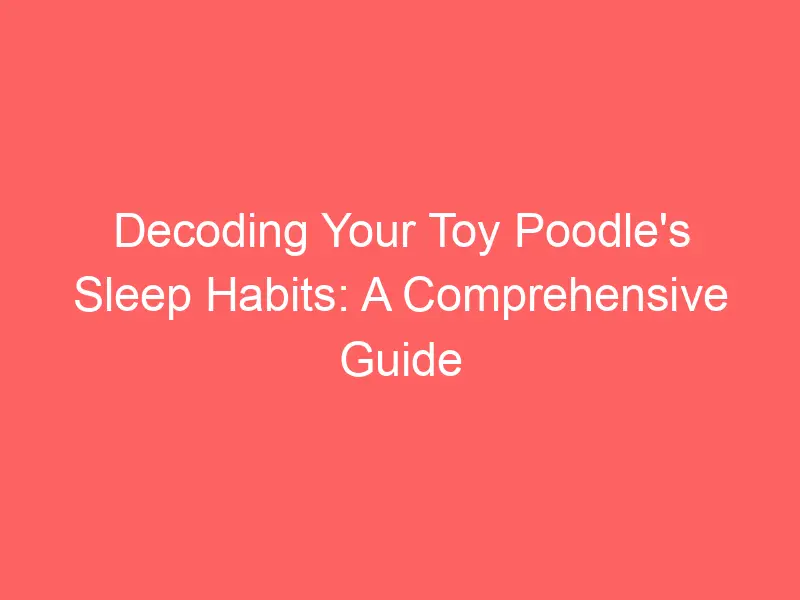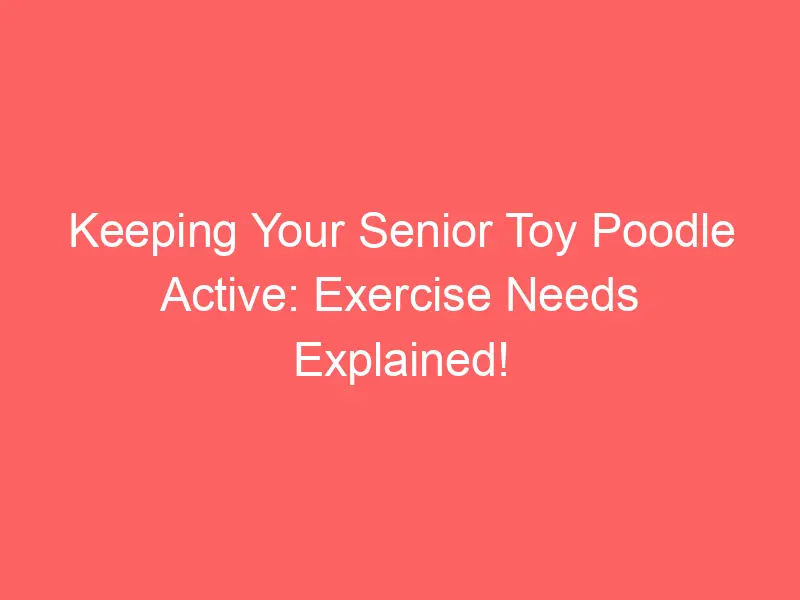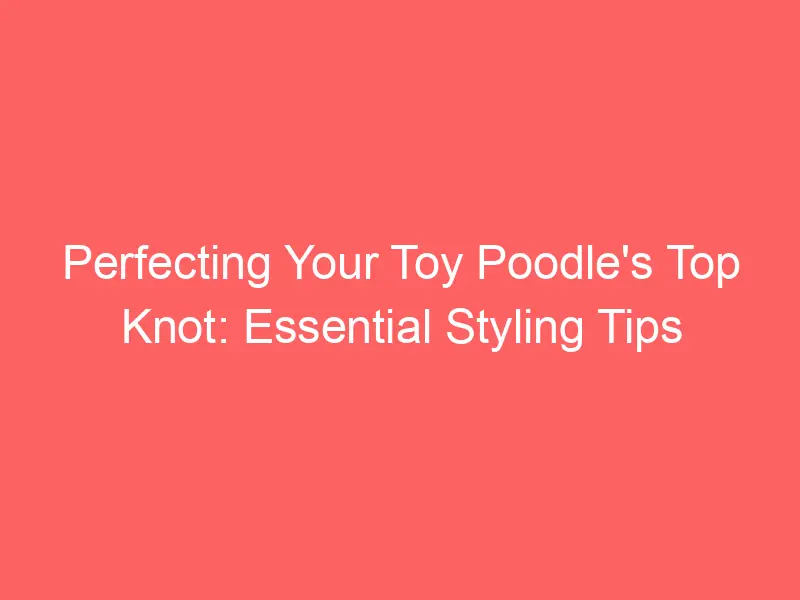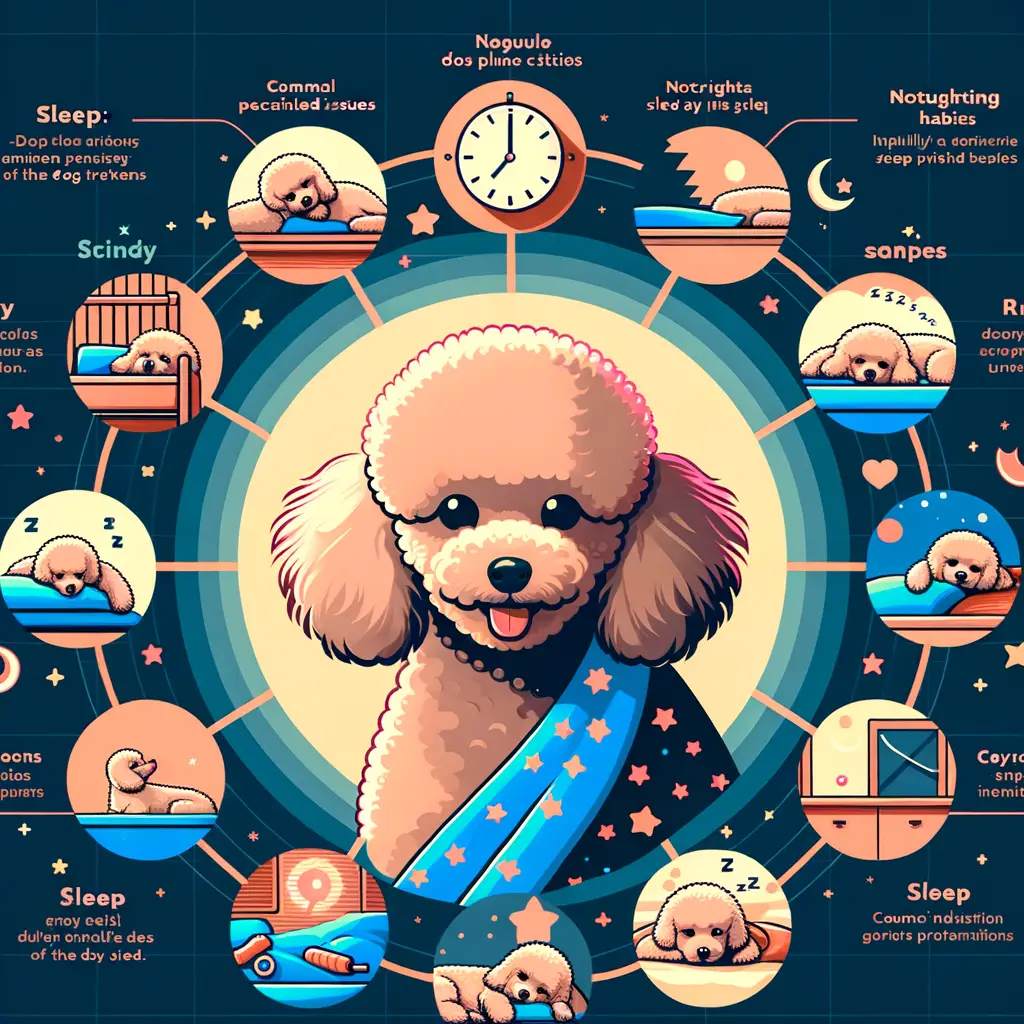
Introduction to Toy Poodle Sleep Habits
As a Toy Poodle owner, it’s crucial to understand your furry friend’s sleep habits. This knowledge will not only help you ensure their health and happiness, but also strengthen your bond with them. In this section, we’ll explore the importance of sleep for your Toy Poodle and provide an overview of their typical sleep patterns.
- Understanding the importance of sleep for your Toy Poodle
- Overview of typical Toy Poodle Sleep Patterns
Sleep is essential for all dogs, including Toy Poodles. It helps them recover from the day’s activities, promotes growth and development, and aids in maintaining a healthy immune system. A lack of sleep can lead to a variety of health issues, such as obesity, heart disease, and behavioral problems. Therefore, ensuring your Toy Poodle gets enough sleep is crucial for their overall well-being.
Toy Poodles typically sleep for about 12 to 14 hours a day. Puppies and older dogs may sleep even more. They often have two main sleep periods: a longer one at night and a shorter one during the day. However, each Toy Poodle is unique, and their sleep patterns can vary depending on factors like age, health, and activity level. Observing your Toy Poodle’s sleep habits can help you identify any changes that might indicate a health problem.
In the following sections, we’ll delve deeper into understanding Poodle sleep, decoding your Toy Poodle’s night routine, and addressing Poodle sleep issues. Stay tuned to gain a comprehensive understanding of your Poodle’s sleep.
Understanding Poodle Sleep
When it comes to understanding our furry friends, sleep is an important aspect to consider. This is especially true for Toy Poodles, a breed known for its lively and energetic nature. Let’s delve into the science behind their sleep patterns.
The Science Behind Poodle Sleep Patterns
Just like humans, Toy Poodles have their own unique sleep patterns. Understanding these can help us ensure they are getting the rest they need for their health and happiness.
- How the Toy Poodle Sleep Cycle works
- Factors influencing Poodle Sleeping Behavior
Toy Poodles, like all dogs, experience two primary stages of sleep: Rapid Eye Movement (REM) and Non-Rapid Eye Movement (NREM). During NREM, their bodies are resting. In REM, they dream. Poodles spend about 50% of their day sleeping, 30% lying awake but resting, and 20% being active. This is typical for most dogs.
Several factors can influence a Toy Poodle’s sleep behavior. These include their age, diet, and activity level. Puppies and older dogs tend to sleep more than young adults. A diet rich in essential nutrients can promote a healthy sleep cycle. Furthermore, Poodles who get regular exercise often have more regular sleep patterns.
Understanding your Toy Poodle’s sleep patterns can provide valuable insights into their overall health and wellbeing. It’s important to remember that every dog is unique, and what’s normal for one might not be for another. If you notice any sudden changes in your Poodle’s sleep behavior, it’s always a good idea to consult with a vet.
Comparing Toy Poodle Sleep Habits with Other Breeds
When it comes to sleep habits, every dog breed is unique. However, there are some commonalities and differences that we can observe when comparing the Toy Poodle with other breeds.
- Similarities and differences in sleep patterns
- Unique aspects of the Toy Poodle Sleep Cycle
Like most dog breeds, Toy Poodles require a significant amount of sleep. On average, they sleep for about 12-14 hours a day, similar to breeds like the Labrador Retriever and the German Shepherd. However, unlike some breeds, Toy Poodles have a tendency to adapt their sleep pattern to match their owner’s lifestyle. This means that if you’re a night owl, your Toy Poodle may adjust its sleep schedule to stay awake with you.
One difference between Toy Poodles and other breeds is their sleep position. While many dogs sleep on their sides, Toy Poodles often sleep on their backs with their paws in the air. This is a sign of complete trust and comfort.
The Toy Poodle’s sleep cycle is fascinating. Like humans, dogs go through different stages of sleep, including Rapid Eye Movement (REM) sleep and deep sleep. However, the Toy Poodle’s sleep cycle is shorter than that of humans. This means they enter the REM stage more frequently, leading to more dreams.
Another unique aspect of the Toy Poodle’s sleep cycle is their sensitivity to their environment. Toy Poodles are known for their keen senses and intelligence. This means they are more likely to wake up from their sleep if they sense something unusual in their surroundings. This trait makes them excellent watchdogs, but it can also lead to disrupted sleep.
In conclusion, while there are some similarities between the sleep habits of Toy Poodles and other breeds, there are also some unique aspects that set them apart. Understanding these can help you better cater to your Toy Poodle’s sleep needs and ensure they get the rest they need.
Decoding Your Toy Poodle’s Night Routine
Understanding your Toy Poodle’s night routine is essential to ensure they get the rest they need. Let’s delve into the world of Poodle sleep signals and common sleep problems.
Understanding Your Poodle’s Sleep Signals
Just like humans, Toy Poodles have their own unique sleep signals. Recognizing these signals can help you ensure your furry friend gets the rest they need. Here are some key signals to look out for:
- How to recognize when your Toy Poodle is ready for sleep: Your Toy Poodle may start to yawn, lose interest in play, or find a quiet spot to curl up. These are all signs that your Poodle is ready for some shut-eye. Remember, a well-rested Poodle is a happy Poodle!
- Common Toy Poodle Sleep Problems and their signs: Toy Poodles can experience a range of sleep problems. These can include difficulty falling asleep, frequent waking, and restlessness. Signs of these problems can include excessive daytime sleepiness, changes in behavior, and a lack of energy. If you notice any of these signs, it may be time to consult with your vet.
Understanding your Toy Poodle’s sleep signals is the first step in ensuring they have a healthy night routine. Remember, every Poodle is unique, so what works for one may not work for another. Always consult with a professional if you have concerns about your Poodle’s sleep habits.
Establishing a Healthy Toy Poodle Sleep Schedule
Creating a consistent sleep schedule for your Toy Poodle is crucial for their health and well-being. Here are some steps you can take to establish a healthy sleep routine and handle any disruptions.
- Steps to create a consistent bedtime routine
- Set a consistent bedtime: Toy Poodles thrive on routine. Try to set a consistent bedtime and stick to it. This helps your pet understand when it’s time to wind down and go to sleep.
- Limit evening activities: Avoid stimulating activities close to bedtime. Instead, opt for calm activities like gentle play or cuddling.
- Provide a comfortable sleeping area: Make sure your Toy Poodle has a comfortable, quiet place to sleep. This could be a dog bed or a crate, depending on your pet’s preference.
- Implement a bedtime ritual: A bedtime ritual, such as a final potty break or a calming massage, can signal to your Toy Poodle that it’s time to sleep.
- How to handle disruptions in the Toy Poodle Sleep Schedule
- Stay calm: If your Toy Poodle wakes up in the middle of the night, stay calm. Avoid stimulating activities and keep the environment quiet and dark to encourage them to go back to sleep.
- Address any underlying issues: If your Toy Poodle is frequently waking up during the night, there could be an underlying issue, such as discomfort or illness. Consult your vet if you’re concerned.
- Adjust the routine as needed: If disruptions become frequent, you may need to adjust your Toy Poodle’s bedtime routine. This could mean changing their bedtime, adjusting their diet, or modifying their exercise routine.
Establishing a regular bedtime routine for your Toy Poodle can help them understand when it’s time to sleep. Here are some steps you can follow:
Even with a consistent bedtime routine, disruptions can occur. Here’s how to handle them:
Remember, every Toy Poodle is unique and what works for one may not work for another. It may take some trial and error to find the best sleep routine for your pet. Be patient and consistent, and consult your vet if you have any concerns.
Addressing Poodle Sleep Issues
As a Toy Poodle owner, it’s crucial to understand and address any sleep issues your pet may be experiencing. In this section, we will delve into common sleep problems faced by Toy Poodles and provide practical tips to manage them effectively.
Common Toy Poodle Sleep Problems
Toy Poodles, like humans, can suffer from a variety of sleep disorders. These can range from mild to severe, and can significantly impact their quality of life. Let’s explore some of the most common sleep issues and how to address them.
- Identifying and addressing sleep disorders
- Tips for managing behavioral sleep issues
One common sleep disorder among Toy Poodles is insomnia, which can be caused by a variety of factors such as stress, illness, or changes in routine. Symptoms may include difficulty falling asleep, frequent waking, or restlessness during the night. If you notice any of these signs, it’s important to consult with a vet to identify the root cause and develop a treatment plan. Simple changes such as adjusting your poodle’s diet or exercise routine can often help alleviate these issues.
Behavioral sleep issues in Toy Poodles often stem from anxiety or lack of proper training. For instance, your poodle may have difficulty sleeping alone or may wake up frequently due to fear or stress. In such cases, creating a calm and comfortable sleeping environment can make a big difference. Using a cozy bed, maintaining a consistent sleep schedule, and providing plenty of physical and mental stimulation during the day can help manage these behavioral issues. Remember, patience and consistency are key when dealing with behavioral sleep problems.
In conclusion, understanding and addressing your Toy Poodle’s sleep issues is crucial for their overall health and well-being. By being observant and proactive, you can ensure that your furry friend gets the restful sleep they need.
When to Seek Professional Help for Poodle Sleep Issues
As a Toy Poodle owner, it’s essential to understand when your furry friend’s sleep issues may require professional intervention. Here, we’ll explore how to recognize serious sleep problems and how a vet can assist.
- Recognizing serious Toy Poodle Sleep Problems
- How a vet can help with Poodle Sleep Issues
While occasional sleep disturbances are normal, persistent issues may indicate a more serious problem. If your Toy Poodle exhibits signs such as excessive daytime sleepiness, difficulty falling asleep, frequent night awakenings, or abnormal behaviors during sleep, it’s time to seek professional help. These symptoms could be indicative of conditions like sleep apnea, insomnia, or even neurological disorders.
Moreover, if your Toy Poodle’s sleep issues are accompanied by other health concerns such as changes in appetite, weight loss, or behavioral changes, it’s crucial to consult a vet immediately. These could be signs of underlying health issues that need immediate attention.
A vet can provide a thorough examination to identify the root cause of your Toy Poodle’s sleep issues. They may conduct various tests, including blood tests, X-rays, or even a sleep study, to diagnose the problem accurately.
Once the issue is identified, the vet can recommend a suitable treatment plan. This could include medication, changes in diet, or behavioral therapy. In some cases, they may refer you to a veterinary neurologist or a canine sleep specialist for further evaluation and treatment.
Remember, your Toy Poodle’s health and well-being are paramount. Don’t hesitate to seek professional help if you notice any persistent sleep issues. Early intervention can make a significant difference in your pet’s quality of life.
Conclusion: Understanding Your Poodle’s Sleep
As we wrap up our discussion on Toy Poodle sleep habits, it’s important to remember that every dog is unique. While we’ve provided general insights into the sleep patterns of this breed, individual variations may occur. Let’s recap the key points we’ve covered and discuss the importance of continued observation and understanding of your Toy Poodle’s sleep.
- Recap of key points about Toy Poodle Sleep Habits
Toy Poodles, like all dogs, have a different sleep cycle compared to humans. They tend to sleep for around 12-14 hours a day, with puppies and older dogs requiring more sleep. Their sleep is divided into two stages: REM (Rapid Eye Movement) and Non-REM. REM is the stage where they dream, and Non-REM is a deep sleep stage.
Understanding your Toy Poodle’s sleep habits can help you identify any changes that may indicate health issues. For instance, excessive sleep or difficulty sleeping could be signs of illness. Regular vet check-ups are essential to ensure your Toy Poodle is healthy and happy.
- Importance of continued observation and understanding of your Toy Poodle’s sleep
Observing and understanding your Toy Poodle’s sleep habits is crucial for their overall well-being. Changes in sleep patterns can be an early warning sign of health issues. Regular observation can help you detect any abnormalities early, allowing for prompt veterinary intervention.
Remember, a well-rested Toy Poodle is a happy and healthy one. By understanding your pet’s sleep patterns, you can ensure they’re getting the rest they need and provide a comfortable and safe environment for them to sleep in.
In conclusion, understanding your Toy Poodle’s sleep is an integral part of their care. It’s not just about knowing how much they sleep, but also about recognizing the quality of their sleep and being aware of any changes. Your Toy Poodle’s sleep habits can tell you a lot about their health and happiness, so it’s worth paying attention to.
